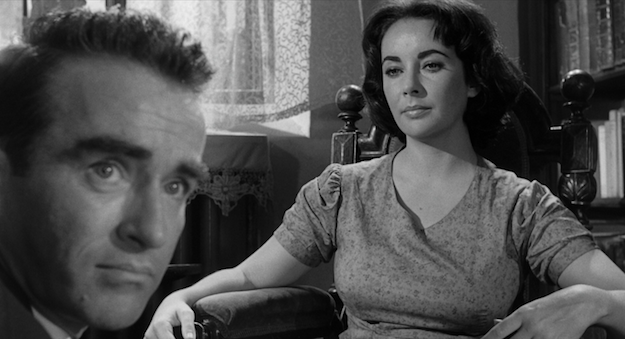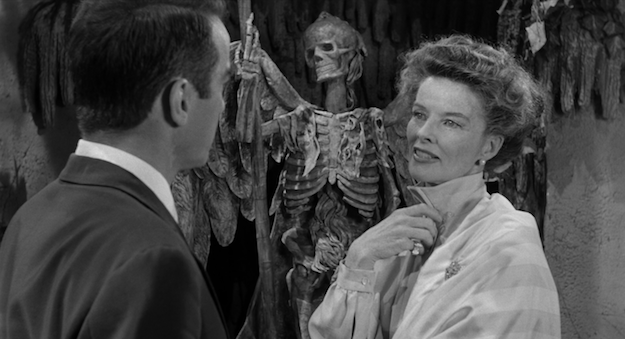| Reviews & Columns |
|
Reviews DVD TV on DVD Blu-ray 4K UHD International DVDs In Theaters Reviews by Studio Video Games Features Collector Series DVDs Easter Egg Database Interviews DVD Talk Radio Feature Articles Columns Anime Talk DVD Savant Horror DVDs The M.O.D. Squad Art House HD Talk Silent DVD
|
DVD Talk Forum |
|
|
| Resources |
|
DVD Price Search Customer Service #'s RCE Info Links |
|
Columns
|
|
|
Suddenly, Last Summer
The Movie:

Suddenly, Last Summer (1959) is a bold adaptation of an even bolder one-act play by Tennessee Williams that has been disowned by many of the central creators involved. It touches on Williams's pet themes of institutional homophobia and misogyny, but has to soft-pedal the playwright's points to get around the restrictive Hays Production Code. Williams hated the movie. Screenwriter Gore Vidal knew how to write about homosexuality between the lines (see also: his script-doctoring for Ben-Hur), but he was so displeased with director Joseph L. Mankiewicz's work that Vidal also publicly bad-mouthed the movie not long after its release.
The film was also dogged by stories of strife on the set. Montgomery Clift was deep in the thrall of drug and alcohol addiction after the 1956 car crash that left him with lingering pain. Clift's unsteadiness is visible onscreen. In some scenes, he seems totally disconnected from the dialogue he is being made to say. Mankiewicz wasn't supportive of him either, lobbying hard to get him fired. In an oft-told story, Katharine Hepburn was so upset over the way Clift was being treated that she spit in Mankiewicz's face the moment that her role was wrapped on the film.
It should be no surprise then that the completed film is uneven. The film's three stars -- Clift, Hepburn, and top-billed Elizabeth Taylor -- pitch their performances at drastically different levels. Hepburn is repressed and mannered, Clift is all Method-y mumbles, and Taylor goes so big and bold that you might expect a cabal of drag queens hired her to generate future material for them. Behind the camera, Mankiewicz similarly has trouble finding a coherent approach to realizing Williams and Vidal's mélange of cruel poetry and seamy melodrama. The film dips in and out of camp, but features plenty of gripping encounters. In fact, despite the unevenness, Suddenly, Last Summer is fitfully brilliant and consistently entertaining.
The film opens up the original one-setting, one-act play, but Vidal's script maintains a feeling of theater by having the story unfold in long two-person conversations and monologues. Hepburn makes the first impression, as wealthy widow Violet Venable. It's 1937, and she has heard that an up-and-coming doctor, John Cukrowicz (Clift), is doing pioneering work with lobotomies at a nearby mental institution that is strapped for cash. She invites John to her mansion to pitch him on the idea of performing brain surgery on her disturbed niece. When Hepburn drops a fly into the leafy lips of a hungry Venus Flytrap before leading John on a stroll through her elaborate garden, the implication about her is quite clear. She's a predator (but, it turns out, not the only one).
John asks to meet with Mrs. Venable's niece, Catherine Holly (Taylor). Miss Catherine, as the doctor calls her, is far from a hopeless case. She has a willful disregard for authority, and she was clearly traumatized by the death of gay poet Sebastian, who was her cousin and Mrs. Venable's beloved son, last summer*. But Miss Catherine doesn't seem like a prime candidate for lobotomy.
The film slowly reveals itself to be a mystery story of sorts, with John searching for the cause of Sebastian's death and for the reason that Mrs. Venable wants to make sure the facts surrounding that death are surgically removed from her niece's brain. It all leads to a dramatic showdown where John is able to unrepress the memories of that fateful day from Miss Catherine's mind, while her family members and the hospital staff look on. Mankiewicz stages the demise of Sebastian like a sequence from a Universal monster movie, with the faceless, predatory poet becoming the unhappy prey, under the scorching Spanish sun, with Miss Catherine's anguished face visible during the retelling, in gauzy split screen.
Suddenly, Last Summer is often used as a signpost of Hollywood's #problematic representation of gay characters. As The Celluloid Closet illustrates, Sebastian is never given a voice or a face, and he comes to a gruesome end. In fact, the only way that the film skated by without censorship is because it represented homosexuality as a regrettable lifestyle. On paper, this is true, but on the screen, the competing sensibilities of the purportedly homophobic Mankiewicz and his queer scribes make Suddenly, Last Summer a much more contradictory, complicated, and fascinating watch.
The power of the performances cannot be discounted in this respect. Hepburn is cold and steely, a Southern belle who has slowly hardened into a distant dowager empress. Her character's comeuppance involves a leap off the deep end of sanity, but Hepburn remains understated, investing this villain with sympathetic gravitas. Taylor is the opposite: nothing but heat. Her warmth seemingly thaws Clift out of his stupor in their scenes together. She's open with her character's thoughts, emotions, and sexuality. She expresses Catherine as a character who has been made to yield her beauty as a weapon, but is still wobbly as a baby fawn when it comes to emotional connection. It's a star performance, bar none.
While the film is dominated by Taylor and Hepburn, Mercedes McCambridge makes a welcome appearance as Catherine's slightly unsavory mother. She and her son (Gary Raymond) are typical poor relations, reveling in the money and belongings left to them after Sebastian's demise. If you remember Hilary Swank's awful family members from Million Dollar Baby, these characters are cut from the same cloth.
*The "last summer" of the title. That title is repeated at least four times throughout the film, in case you're still not sure what everybody is so upset about.

The Blu-ray
Suddenly, Last Summer comes in a limited edition of 3000 copies. It includes a booklet featuring a liner notes essay by Twilight Time's Julie Kirgo.
The Video:
Sony has been providing Twilight Time with delicious 4K restorations of their old films, and this one is another beaut. This AVC-encoded 1080p 1.85:1 offers excellent depth and clarity, perfectly resolved film grain (with no pesky digital noise), and striking contrast. Inky blacks with subtle shadow detail. I can't imagine this flick looking any better on Blu-ray.
The Audio:
A top-notch remaster on the DTS-HD MA 2.0 mono audio as well. Despite the narrow soundstage, the mix offers a full, rounded sound, with the dialogue clean and understandable, even when the film lays on the musical score a little too thick.
Special Features:
Final Thoughts:
Suddenly, Last Summer is a mishmash of stylistic choices and artistic intentions, but it holds together for the most point, thanks to the forceful and gripping performances of Elizabeth Taylor and Katharine Hepburn as the two female leads. Recommended.

Justin Remer is a frequent wearer of beards. His new album of experimental ambient music, Joyce, is available on Bandcamp, Spotify, Apple, and wherever else fine music is enjoyed. He directed a folk-rock documentary called Making Lovers & Dollars, which is now streaming. He also can found be found online reading short stories and rambling about pop music.
|
| Popular Reviews |
| Sponsored Links |
|
|
| Sponsored Links |
|
|
| Release List | Reviews | Shop | Newsletter | Forum | DVD Giveaways | Blu-Ray | Advertise |
|
Copyright 2024 DVDTalk.com All Rights Reserved. Legal Info, Privacy Policy, Terms of Use,
Manage Preferences,
Your Privacy Choices | |||||||














